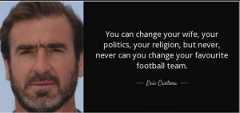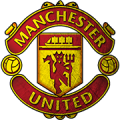
Discussions here at WSA recently turned to the subject of football “legends” and the qualifications required in order to become one.
The conversation all started when someone in the office was reading a piece from manutd.com which was about club “legend” Denis Irwin.
The question here is; what has Irwin personally done to deserve the title? Note the word “personally“, because this is what should determine whether a person deserves the legendary status or not.
Many people think that, because Irwin won many titles and cups during his long spell with Manchester United, then this entitles him to be called a legend. We happen to disagree.
Would you, for example, include Denis Irwin’s picture along with the legends at the top of the page? Was he really that good? Quite simply, no he wasn’t!
He may have played for a legendary TEAM, (and the operative word here is “team“), but he did nothing extraordinary throughout his time there. He was a steady, reliable performer and was an excellent left back whilst also being a very good right back.
People who think he should have the title legend, along with anybody else who has ever worn a United shirt including the likes of Quinton Fortune, point to the number of trophies he has won and cite this as to why he is legendary. It is not a reason.
A tennis player with twenty major titles is a legend because they have won most, if not all of them, on their own. Most football players are not legends.
Tony Dunne played 46 more league games than Irwin but didn’t win anywhere near as much. Stewart Houston and Arthur Albiston both played left back for Manchester United for many years and were both regulars in the Scotland team when it was half decent. Yet none of these are regarded as legends. Why not?
The only difference between them and Irwin, apart from the number of trophies won, is that none of them were lucky enough to play for United when Sir Alex Ferguson was manager and they had a great team. If they had, then Dunne, Houston and Albiston would have won just as many trophies as Irwin and would qualify as legends.
So, based on these facts, the criteria for some players being a legend, at least at Manchester United, is luck, being in the right place at the right time. Nothing else.
This would be almost acceptable if it wasn’t for the fact that even some of the worst United players, who didn’t play anything like the number of games as others, are described by the club as legends. What is the reason for their being known as legends?
There isn’t one, is the simple answer. There is no rhyme nor reason as to why some of these clowns are given legendary status. At least Irwin was a long-serving, successful and very good player. What have the others done? And by others, yes we mean Quinton Fortune, but also Phil Neville, Louis Saha, Mikaël Silvestre, Jesper Blomqvist and Dion Dublin.
LEGENDS!!? What the heck does that make Law, Best and Charlton then?
The problem is that there is a modern penchant to hand out meaningless titles to all and sundry whether they deserve it or not. OBE’s and MBE’s are strewn around like confetti. Some go to people who are thoroughly deserving of it, some don’t. Knighthoods are the same except that you generally have to make it to seventy years of age before being awarded one, a little like becoming a judge!
You can spend your life shouting down a microphone and proving to the world that you can’t sing but, as long as your name is Mick Jagger, you will be knighted anyway, whether Keith Richards likes it or not.
So recent history has shown us that not a lot is required of a footballer to be given legendary status.
Back when WSA started watching football every top team appeared to have at least three legends in their ranks. United had the triumvirate, Spurs had Dave Mackay, Jimmy Greaves and Danny Blanchflower, Chelsea had Charlie Cooke, Peter Osgood and Ron Harris, Liverpool had Ron Yeats, Roger Hunt and Ian St. John. The list went on and the fans of these clubs would probably say that there were even more legends than we have recorded here.
But they weren’t legends because they had won lots of trophies or league titles. No, they were legends because they excelled in a team of very good players, similar to the players in the headline photo.
Denis Irwin was just one of the very good players who, because he played in an excellent team which DID contain some legends, won a lot of medals throughout his long career.
Stop using the word “legend” when it clearly does not apply to the subject, it is an insult to genuine legends.




























